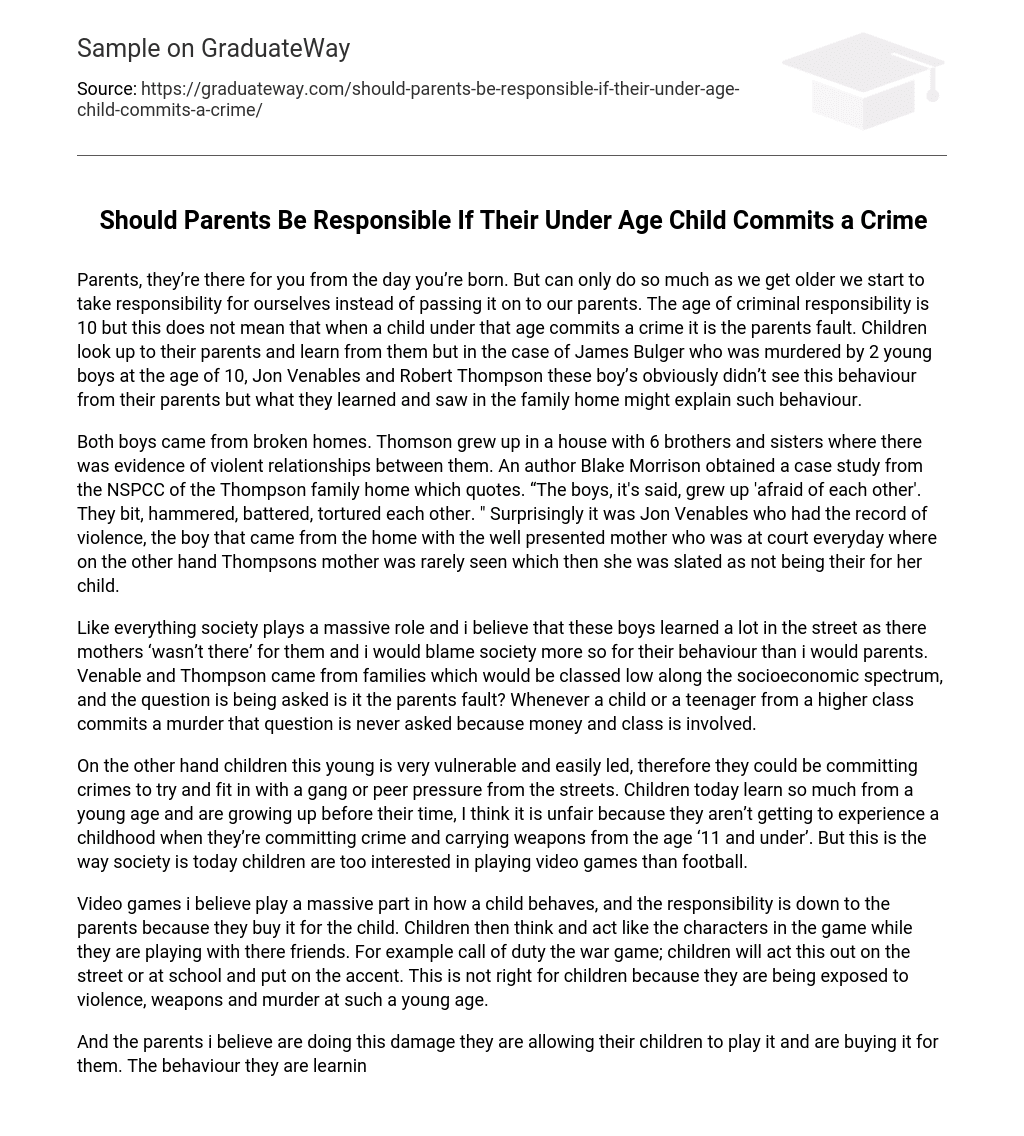As we get older, our responsibility towards ourselves increases and we become less dependent on our parents. However, it is important to recognize that since the moment of our birth, parents have always provided us with support and guidance. It is worth considering that even though the legal age for criminal responsibility is 10, parents should not be held accountable when a child under this age commits a crime. Children often mimic their parents’ behavior and look up to them. However, in the tragic case of James Bulger’s murder by two young boys named Jon Venables and Robert Thompson, it is clear that these boys did not witness such behavior from their own parents. Nevertheless, it is possible that their misguided actions were influenced by the environment and upbringing they experienced at home.
Both boys, Thomson and Jon Venables, experienced challenging family situations. Thomson grew up in a household with six siblings, where there were evident signs of violent relationships among them. Author Blake Morrison obtained a case study from the NSPCC, documenting the Thompson family home, which stated, “The boys, it is reported, grew up ‘fearful of each other’. They would bite, hammer, beat, and torment one another.” Interestingly, it was Jon Venables who had a history of violence, despite coming from a home with a well-presented mother who attended court regularly. On the other hand, Thomson’s mother was rarely seen, leading to criticism of her absence in her child’s life.
The absence of their mothers greatly influenced these boys, leading me to believe that society played a significant role in shaping their behavior. Instead of blaming their parents, I would attribute their actions more to societal influences. Venable and Thompson grew up in low socioeconomic backgrounds, which raises the question of parental accountability. Interestingly, when a child or teenager from a higher social class commits murder, parental responsibility is seldom questioned because wealth and social status are often seen as contributing factors.
It is worrisome that young children are susceptible to being influenced and engaging in criminal activities, whether it is to conform with gangs or because of peer pressure. Currently, children are acquiring knowledge at a young age and developing faster, which regrettably results in them missing out on a normal childhood. It is alarming that some kids as young as 11 years old, or even younger, are involved in criminal acts and carrying weapons. Unfortunately, this represents the sad reality of contemporary society where children prioritize video games over traditional physical pastimes like playing football.
Parents should take on the responsibility of monitoring and controlling their children’s exposure to video games due to the significant influence these games have on a child’s behavior. During gameplay, children often imitate the actions and behaviors of characters, especially when playing with friends. This can be observed in games like Call of Duty, which has a war theme, as children may mimic actions and even adopt accents from the game in their everyday lives. Nevertheless, it is improper to expose young children to violence, weapons, and murder.
Parents are responsible for the negative effects of video games on their children. They allow them to play and buy these games, resulting in real-life behaviors influenced by the games. Thus, parents share responsibility for their children’s behavior despite providing love, attention, and a good upbringing without guaranteeing flawless development.
Although most killers come from disadvantaged backgrounds and carry heavy emotional burdens, they still hold responsibility for their crimes. Therefore, it is unjust to blame the parents. When a child commits a crime, the parents already face severe consequences such as public scrutiny and safety concerns. They often have to move and change identities which serves as enough punishment since they have dedicated themselves to raising their child properly.
Although social services are often aware of children involved in criminal activities, these children continue to receive care and supervision from their parents. Furthermore, the likelihood of children from single-parent households engaging in criminal behavior is significantly higher – nine times greater, to be exact. Personally, I agree with this assertion as unstable homes can expose children to ongoing conflict or abuse, causing them to internalize blame and develop a negative perspective on life. Consequently, they may express their frustration by targeting others, particularly within the school environment.
Concerning student behavior, they may exhibit negative conduct towards teachers and participate in bullying. Moreover, their completion of homework assignments may lack consistency. I am of the opinion that when a family gets involved with social services, it establishes a cycle that is difficult to break. For instance, if a child is placed in care, it is highly probable that the mother has previously interacted with social services. Currently, there is an ongoing poll in America questioning whether parents should bear responsibility when a child commits a crime. The results indicate that 53% voted in favor of holding parents accountable, while 47% opposed.





